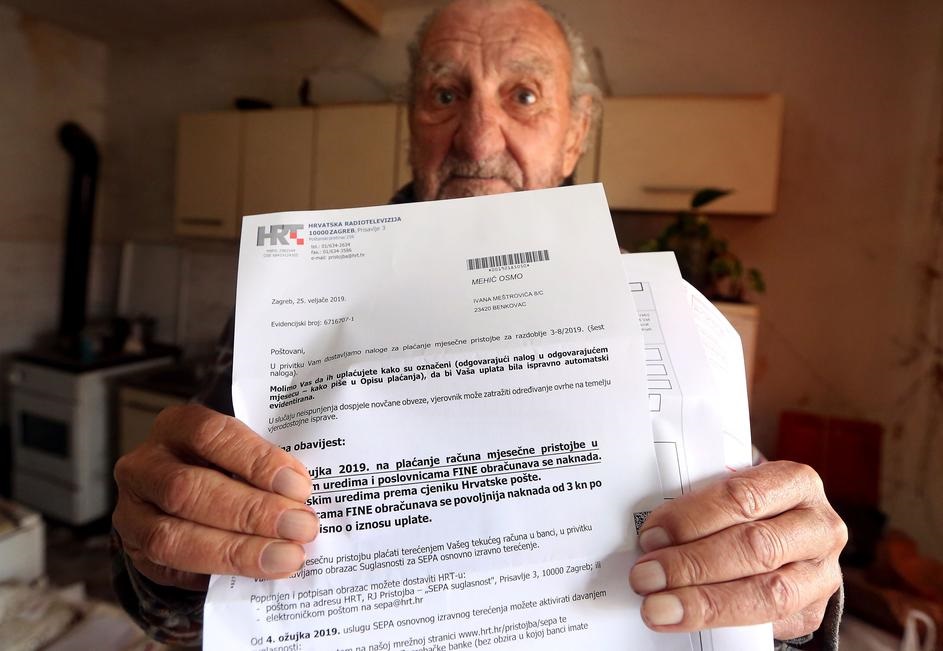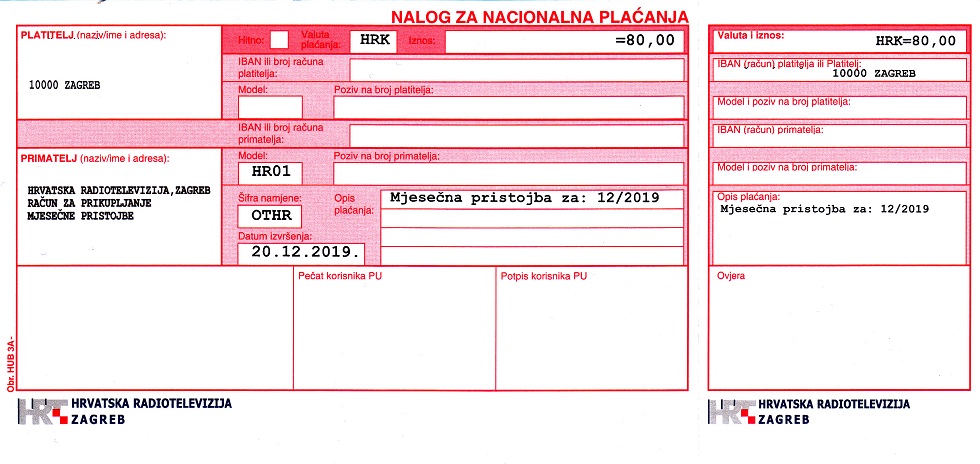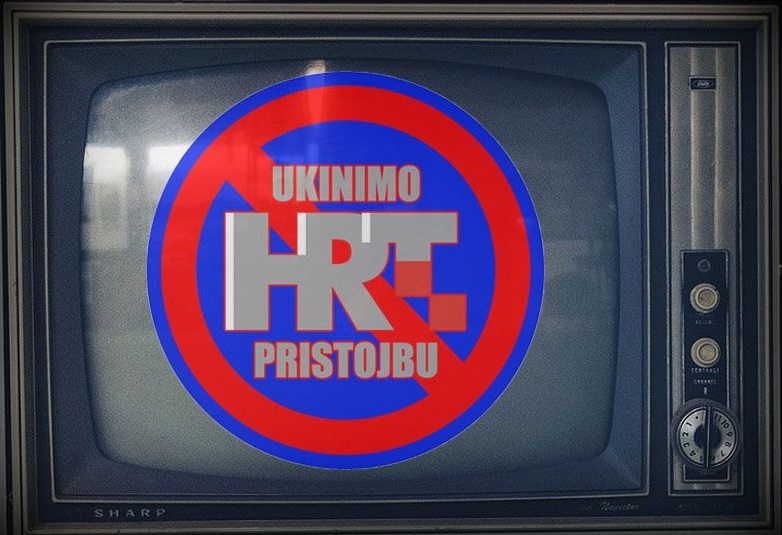Croatian Radio Television Editor: HRT Needs Funding for Better Programs!
“If everyone paid 96 HRK (12,90 EUR) a month to HRT (Croatian Radio Television), we could perform miracles.” It’s not that ideas are lacking, or that people aren’t creative,” according HRT’s Editor-in-Chief, but HRT is not receiving adequate funding.
HRT, the main public broadcasting service in Croatia, is funded mostly through a compulsory monthly subscription fee of 80 HRK (10,75 EUR).
Program Council Postponing Presidential Election to 2020
On Monday, the HRT Program Council postponed the election of a president until their next session, which is scheduled for January 27. They also discussed Croatian Radio Television's production program for 2020, without providing a positive appraisal of that program, according to Telegram/HINA on December 16, 2019.
The election for the President of the Program Council was postponed after council members failed to elect a president during the four election rounds at the last session in mid-November. None of the candidates had achieved the required six vote majority.
The program council currently consists of nine members, although eleven are legally mandated. On Monday they also discussed the public service broadcasting program for the upcoming year. However, only five members gave the proposed program a "positive assessment” and included their recommendations in the Program Council's comments, while three members abstained.
Croatian Radio Television 2020 Program Still Under Review
HRT's program for next year was presented by the public service broadcasters, who emphasized that the monitoring of Croatia's EU Council Presidency, the European Capital of Culture in Rijeka, the EURO and the Olympic Games in Tokyo are among most important upcoming projects in 2020.
During the discussion regarding the upcoming planned Croatian Radio Television output and the implementation of contractual programming commitments; the members of the Program Council made several comments, most notably about the informative programs, the procurement and selection of content from external productions and the output of local HRT stations.

Stipe Alfier | HRT
Did Not Report Zagreb Advent Misconduct and Presidents’ Bus Accident
Recently elected HRT Program Council member Stipe Alfier sharply criticized HRT’s public service broadcasting and cited the recent avoidance of major news topics in news programs - including the alleged misconduct of the Zagreb Advent Organization and the failure to report a bus accident during Kolinda Grabar Kitarovic’s presidential campaign.
Katarina Periša Čakarun, the head of HTV's Information Media Services (IMS) department, dismissed Alfier's allegations regarding HRT’s avoidance of these topics. Bruno Kovačević, editor-in-chief for all HTV television programs, emphasized that there was room for further improvement in HRT programming in accordance with their obligations, and the agreement between HRT and the Croatian government.
Need to Raise Monthly Fee for Better Programming
"We could produce much better programming. It’s not that ideas are lacking, or that people aren’t creative. Don’t forget that our fee has been 80 HRK (10,75 EUR) a month for the last nine years. It should be 96 HRK (13 EUR). According to our calculations, 96 HRK would amount to 1.5 percent of the average net salary in Croatia (6,418 HRK or 862,11 EUR). We could perform miracles with that 16 HRK difference,” Kovačević declared.
Note that the well-known UK-Based public broadcaster BBC has a similar compulsory monthly fee, which is currently 15,26 EUR and only 4,5 EUR more than the HRT fee. According to recent statistics, the average UK monthly net salary is 2907 EUR, which means that the BBC monthly fee for UK residents is on average only 0.525 percent of their monthly take-home income!
In addition to discussing programming, the HRT Program Council members also created a list of candidates for the Commissioner for HRT Consumers position after a public call for applications. Ten applications have been submitted.
Compulsory Monthly Fee Under Increased Scrutiny
The compulsory monthly HRT subscription fee has recently come under increased scrutiny. Up until 2015, HRT inspectors could enter private homes and businesses to verify that occupants owned receivers, which are defined as any device that can receive an HRT television or radio broadcast. If the inspector verified that the home owner, resident, tenant or business owner owned a receiver, they were required to pay the HRT monthly subscription fee.
The inspectors also had the authority to assign the compulsory 80 HRK fee, even if no one answered the door for this inspection, which is no longer the case. If certain conditions are met, a resident can submit a written request to be exempted from paying the monthly fee. Those conditions include: not owning a receiver, moving into assisted living or a nursing home and death. All three conditions require written statements and supporting documents. More information and an application can be found here.
According to Luka Filipović/tportal on December 16, 2019 – HRT representatives have confirmed the recent court ruling that an authorized HRT inspector is not allowed to enter a home or apartment unless the occupant provides consent.

Ukinimo HRT Pristojbu | Facebook
Croatian Radio Television Inspectors Can't Enter Without Consent
"The authorized HRT inspectors do not have a court order to enter a home or apartment. When performing field inspections, they are obliged to furnish their official HRT identification. They can perform an inspection only in the event of a residents' consent. That inspection involves entering an apartment and making a record of established facts," Croatian Radio Television explained.
HRT reports payment inspections for a specific area to local police stations and informs them of the authorized HRT inspectors who will be conducting those inspections. "If citizens call the police during the surveillance procedure, the police will not respond because the the inspector's activities have already been reported to the local police stations," HRT emphasized.
Citizens Should Contact Police Regarding HRT Inspector Misconduct
A representative for the Croatian police emphasized that citizens are encouraged to request a police intervention by dialing 192 if they believe that their rights have been violated or have been subject to unlawful behavior. "A police report is submitted immediately, and officers will go to the scene to collect relevant information and analyze the event," a MUP representative explained.
Follow our Lifestyle page for updates on HRT programming and changes to the compulsory monthly fee.
Croatian Radio Television (HRT) Monthly Fee: Everything You Need to Know
According to the law, an 80 HRK monthly fee (or mjesečna pristojba), payable to HRT (Croatian Radio Television), is mandatory for anyone who lives in Croatia and owns a receiver which can accept transmissions of radio or audio-visual programs. Here is an explanation of where that money goes, your rights and how you can obtain an exemption.
You’ve just settled into a new address in Croatia and hear a knock on your door. But you don't answer, so they leave. Days later you receive your first monthly bill for 80 HRK (10,75 EUR) payable to HRT (Croatian Radio and Television)! Until recently, this questionable conduct was legal.
For a non-EU citizen, the controversial mandatory monthly HRT fee (or mjesečna pristojba) may come as an unwelcome surprise. HRT is considered “public television” in Croatia. Public television in the United States, for example, is mostly funded by donations from corporations, private benefactors and so-called “viewers like you”. So, by comparison, they depend mostly on revenue from voluntary, rather than mandatory sources. Only about 11% of US public television revenues come from federal sources, which are funded indirectly by taxpayer dollars.

mjesečna pristojba
Who has to pay the Croatian Radio Television (HRT) monthly fee?
According to the Law on Croatian Radio and Television (Zakon o Hrvatskoj radioteleviziji), the monthly fee is mandatory for anyone who owns a receiver which can accept transmissions of radio or audio-visual programs. Radios, TVs, computers, laptops, car radios, smartphones and tablets are all considered receivers. If you or anyone in your household owns one or more of these receivers (one fee per household), you are required by law to pay the fee even if you're just a tenant.
Where does the HRT money go?
This monthly fee is not entirely allocated to HRT, rather a portion of it is earmarked for a special fund which finances other forms of electronic media.
HRT, as a public service broadcaster, and the beneficiary of a largest portion of the fee, must comply with a series of federal legal guidelines, and provide regular financial reports to the Croatian Parliament and public. The law stipulates that this type of public financing (along with the proceeds from advertising) ensures financial independence and therefore promotes high-quality independent media programming. You can read in more detail about these allocations here. A summary of how that money is allocated:
68.4% | 55 HRK - Program production costs.
11.7% | 9 HRK - Broadcasting, including appropriations for Transmitters and Communications (OiV), the Croatian Composers Society (HDS), the Croatian Performing Rights Protection Association (HUZIP) and the Association for the Protection, Collection and Distribution of Phonogram Rights (ZAPRAF).
4.5% | 3,5 HRK - Legal fees (the Fund for the Promotion of Pluralism and Media Diversity, the Electronic Media Council and the Croatian Audiovisual Center).
4.4% | 3,5 HRK - Expenses for the organizational units of the Croatian Broadcasting Company which are related to the performance of a public activity (Working Unit Fee of Croatian Radio-Television, Working Unit Archive of Croatian Radio-Television, Working Unit Internal Audit of Croatian Radio-Television).
11% | 9 HRK - Operating expenses (provisions, value adjustments and financial expenses).
Why wouldn’t people want to pay the HRT fee?
A monthly fee of 80 HRK may not seem like a lot of money. Nevertheless, that totals 960 HRK/130 EUR annually which is no small amount; especially for students and retirees. A supplemental health insurance policy or “dopunsko osiguranje” often costs less. And some people simply do not have, or don’t use, any of their receivers to watch or listen to HRT programming. So, why should they pay for a service they don’t use? A group called “ukinimo HRT pristojbu” (let’s abolish the HRT fee) has existed on Facebook since 2015 and has over 41,000 followers. Their website can be accessed here.

“ukinimo HRT pristojbu” (let’s abolish the HRT fee) | Facebook
How to obtain an exemption
It is possible to apply for an exemption. In order to unsubscribe from the mandatory fee, it is necessary to fill in the cancellation form titled “Zahtjev za odjavu obveze plaćanja mjesečne pristojbe”, which can be downloaded here. Just complete it, sign it and deliver it to the following address:
HRT
RJ PRISTOJBA
Prisavlje 3
10 000 Zagreb
This can be done in person, by mail or through an authorized individual. It is important to note that it is no longer necessary to authenticate (or notarize) the form. The cancellation takes effect from the first of the following month from the date of the signed received cancellation form.
The HRT cancellation form notes three acceptable reasons to “unsubscribe” from the fee:
- No receivers (for watching or listening to HRT programming). A separate written signed declaration must be included with the form.
- Moving to assisted living or a nursing home. Proof of the new address must be provided.
- Death of the “subscriber”. A death certificate is required.
Since most people have at least one receiver, choosing the first option seems infeasible. However, the burden of proof falls on HRT, and a recent court decision has made that burden even more difficult.
Is an HRT Inspector allowed to enter your home?
Due to a judgement from the High Administrative Court (Visoki upravni sud), enacted in August 2015, which bans unauthorized entry into private homes, no one is permitted to enter a private apartment or house without a court order and the presence of an authorized person (i.e. a police officer).
Therefore, no one is required to allow an HRT Inspector to enter their home to verify possession of any receivers. Recently, the Croatian Consumer Network (Mreža potrošača Hrvatske) went even further and claimed that HRT Inspectors were violating the law by conducting these payment checks for HRT. They urged citizens to resist "HRT arrogance" and call the police when they see HRT Inspectors in buildings or in front of their homes.
Nevertheless, there have been reports of recent incidents where people have allowed HRT Inspectors into their homes. Most of these cases involve tenants and students, who are unaware of the recent legislation.
A recent court decision also rejected the HRT practice of automatically subscribing anyone who doesn’t allow an HRT Inspector to enter their home, according to Narodni List. Before that court decision, that person would automatically begin to receive monthly bills for a subscription if they had refused entry to an HRT Inspector. That is no longer the case today. This also applies to ex-subscribers and HRT is not allowed to re-subscribe anyone by default.
How can HRT legally demand payment of the monthly fee?
The recent court ruling also explains that HRT may, however, file a misdemeanor charge (indictment) and initiate proceedings against anyone who is suspected of watching or listening to HRT programs on their receivers. Since a private household can legally refuse entry to an HRT Inspector, it will be difficult for HRT to prove that a household owns any receivers or uses them for HRT programming. However, streaming HRT content on a PC or the HRT smartphone app requires a user to register with an email address on the HRT website, which would allow their activity to be monitored.
For fans of HRT programming, the 80 HRK per month might be considered money well-spent. HRT continues to produce an array of fine programs, all of which can be streamed online, including the acclaimed Novine series, which was picked up by Netflix last year.
For more information on Croatian media and culture follow our Lifestyle page.

